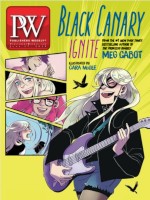The Global Literature in Libraries Initiative (GLLI) is a project aimed at promoting international literature and translations in libraries. “Our goal is to raise the visibility of books beyond the traditional Anglophone space in libraries,” says founder Rachel Hildenbrandt, who established the organization two years ago. “Libraries are the last truly democratic space in American life and by helping librarians locate, program, and feature books in translation, they can serve their own multilingual, multiethnic communities.”
Hildenbrandt works as a translator from German to English and is married to a librarian; she joined the American Library Association last year as an associate member and will, for the second time, host a table at the ALA Annual Conference, which will be held in Washington, D.C., later this month.
Several publishers will display translated titles at the GLLI booth, including Amazon Crossing, Archipelago, Catalyst, Deep Vellum, Europa Editions, and Restless Books. In addition, GLLI will participate in education sessions, including one on immigrant, refugee, and exile authors.
“We are keen to promote literary translations, but at the same time, we are eager to discover and promote translations that appeal to a general readership—the type of book that a book club would want to read,” Hildebrandt says. Accordingly, she has focused her efforts on getting attention for young adult literature and launched a GLLI Translated YA Book Prize last year.
The inaugural award was won by the first two volumes of My Brother’s Husband (Pantheon), by Japanese author Gengoroh Tagame, translated from the Japanese by Anne Ishii. The prize will be presented at a ceremony at the ALA conference, where three other titles will be acknowledged as honor books: La Bastarda (Feminist Press) by Trifonia Melibea Obono, translated from the Spanish by Lawrence Schimel; Piglettes (Pushkin Children’s), written and translated from the French by Clémentine Beauvais; and Wonderful Feels Like This (Flatiron) by Sara Lövestam, translated from the Swedish by Laura A. Wideburg. The prize is honorary and carries no monetary award at present.
Hildenbrandt says that she would like to develop a searchable database of titles of translated literature for librarians and expand into webinars on topics ranging from catalogue development to how to host a book club in a foreign language. “I have gotten calls from librarians looking for books in Russian or Spanish, for example, so I know there is a need,” she says.
GLLI is already winning fans among publishers. “I don’t know a single librarian who is against the idea of including more international literature in their library systems,” says Michael Reynolds, editor-in-chief of Europa Editions. “So, I feel it is up to us, publishers of international literature, to do a better job of making library systems aware of what we publish. The GLLI is working in this direction and making terrific strides.”



 Volume 266
Issue 24
06/17/2019
Volume 266
Issue 24
06/17/2019





